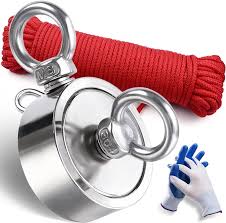Physical Address
304 North Cardinal St.
Dorchester Center, MA 02124
Physical Address
304 North Cardinal St.
Dorchester Center, MA 02124

Magnet fishing is a unique and rapidly growing hobby that combines the thrill of treasure hunting with the simplicity of fishing. Instead of using a hook and bait to catch fish, magnet fishing enthusiasts cast powerful magnets into bodies of water, hoping to retrieve metal objects lost or discarded over time. This activity has gained popularity due to its accessibility, environmental benefits, and the potential to discover hidden treasures.
At its core, magnet fishing involves attaching a strong magnet to the end of a durable rope and tossing it into a river, lake, canal, or other water bodies. The goal is to latch onto metal objects submerged in the water and pull them to the surface. The magnets used are typically neodymium magnets, known for their exceptional strength relative to their size. These magnets are capable of attracting a wide range of metal objects, from small coins and nails to larger items like bicycles, safes, and even firearms.

The appeal of magnet fishing lies in the mystery of what might be lurking beneath the water’s surface. Common finds include coins, tools, fishing gear, and bicycles, but many magnet fishers have discovered more unusual and valuable items. Historical artifacts, antique weapons, and even pieces of jewelry are occasionally recovered, making each outing a potential treasure hunt. Some enthusiasts specifically seek out areas with historical significance, hoping to uncover relics from the past.
One of the key benefits of magnet fishing is its positive environmental impact. By removing metal debris from bodies of water, magnet fishers help to clean up the environment. Old bicycles, shopping carts, and discarded tools can pollute waterways and pose hazards to wildlife and humans alike. Magnet fishing provides a way to remove these hazards while enjoying a fun and engaging activity. Many enthusiasts take pride in their efforts to clean up local water bodies and often share their finds on social media to raise awareness about water pollution.
While magnet fishing can be an exciting and rewarding hobby, it’s important to be aware of legal considerations and safety precautions. In some areas, magnet fishing is regulated, particularly in locations with historical significance or where unexploded ordnance may be present. It’s crucial to check local laws and regulations before starting. Additionally, magnet fishers should always wear gloves to protect their hands from sharp or rusty objects and be cautious when handling heavy or potentially dangerous items.
Starting with magnet fishing is relatively easy and inexpensive. Basic gear includes a strong neodymium magnet, a sturdy rope, and gloves. Some fishers also use a grappling hook for retrieving larger items. There are many online communities where beginners can learn from experienced magnet fishers, share their finds, and get tips on the best spots to fish.
Magnet fishing is more than just a hobby; it’s a way to explore the unknown, clean up the environment, and potentially find hidden treasures. Whether you’re in it for the thrill of discovery or the satisfaction of making a positive impact on your local waterways, magnet fishing offers something for everyone. As long as you approach it with respect for the environment and local regulations, it’s a pastime that can be both rewarding and sustainable.